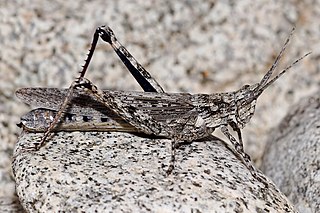
The Acrididae are the predominant family of grasshoppers, comprising some 10,000 of the 11,000 species of the entire suborder Caelifera. The Acrididae are best known because all locusts are of the Acrididae. The subfamily Oedipodinae is sometimes classified as a distinct family Oedipodidae in the superfamily Acridoidea. Acrididae grasshoppers are characterized by relatively short and stout antennae, and tympana on the side of the first abdominal segment.

Bandwings, or band-winged grasshoppers are the subfamily Oedipodinae of grasshoppers classified under the family Acrididae. They have a worldwide distribution and were originally elevated to full family status as the Oedipodidae. Many species primarily inhabit xeric weedy fields, and some are considered to be important locusts:

Conocephalus is a genus of bush-crickets, known as coneheads. It was described by Carl Peter Thunberg in 1815.

The Melanoplinae are a subfamily of grasshoppers in the family Acrididae. They are distributed across the Holarctic and Neotropic ecozones.
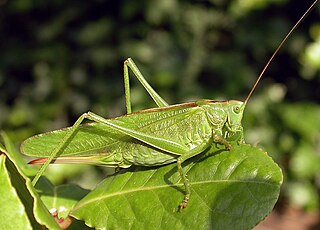
The subfamily Tettigoniinae, sometimes called shield-backed katydids, contains hundreds of species, which are native to the Americas, Australia, southern Africa, Europe, and the Near East. The faunas of the Neotropics and Australia are more closely related to one other than to those of southern Africa, although the three groups are related. They are attributed to an ancient Gondwana fauna which is reflected in the known distribution of the southern African genera, which are in turn related to the North American genera Neduba and Aglaothorax. Many of the common northern European species are in this subfamily.

Stenobothrus is a genus of grasshoppers found in Asia, Europe, and North Africa.
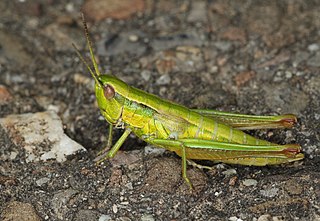
Gomphocerinae, the slant-faced grasshoppers, are a subfamily of grasshoppers found on every continent but Antarctica and Australia.
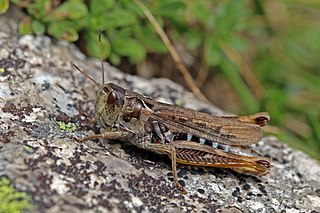
Gomphocerini is a tribe of grasshoppers of the family Acrididae.
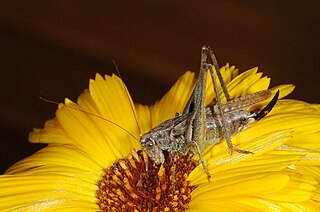
Platycleis is a genus of katydids described by Fieber in 1852, belonging to the subfamily Tettigoniinae. The species of this genus are present in Europe, North Africa and, Asia.

Euchorthippus is a genus of short-horned grasshoppers belonging to the family Acrididae and the subfamily Gomphocerinae. Species are recorded from Europe and temperate Asia.

Gryllomorpha is a genus of cricket belonging to the family Gryllidae subfamily Gryllomorphinae. The species of this genus are present in Europe, in North Africa and in Central Asia.

Oxyinae is subfamily of grasshoppers in the family Acrididae. Species are distributed throughout Africa and Australasia.
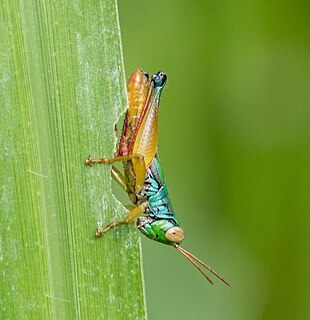
Caryanda is large genus of grasshoppers in the tribe Oxyini; species are recorded from Africa and Asia.

Podismini is a tribe of "spur-throated grasshoppers" in the family Acrididae. This tribe is unlike others in the subfamily Melanoplinae in that a substantial number of genera occur outside the Americas.

Oedaleus is a genus of grasshoppers in the family Acrididae.

Calliptamus is a genus of 'short-horned grasshopper' belonging to the family Acrididae, subfamily Calliptaminae.

Tetriginae is a large subfamily of groundhoppers or pygmy grasshoppers. Members of Tetriginae occur on every continent except Antarctica.
Pteronemobius is a genus of cricket in the subfamily Nemobiinae, with a worldwide distribution.

Eyprepocnemis is a genus of grasshoppers in the subfamily Eyprepocnemidinae with species found in Africa, Southern Europe through to tropical Asia.

Sphingonotus is a genus of grasshoppers in the family Acrididae, subfamily Oedipodinae, found in Europe Africa, Asia and Australia.



















